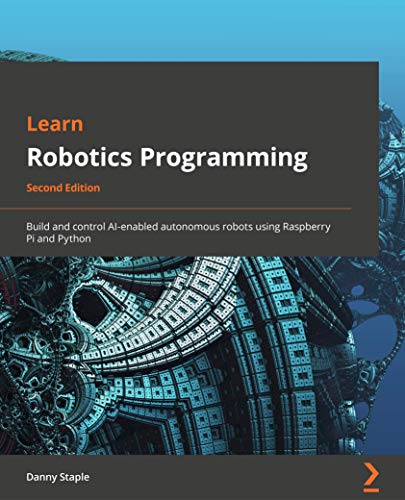Danny Staple is the author of Learn Robotics Programming – Second Edition, we got the chance to sit down with him and find out more about his experience of writing with Packt.
Q: What is/are your specialist tech area(s)?
Danny: Robotics, Python, Computer Vision, Raspberry Pi, Linux, Dev Ops.
Q: How did you become an author for Packt? Tell us about your journey. What was your motivation for writing this book?
Danny: I’ve been building robots for a number of years, writing blog posts and making videos. I’ve also been attending python and robotics conferences. I had collected a lot of experiences and wanted to write about it, and with weeks of that Packt contacted me with a potential book title.
Q: What kind of research did you do, and how long did you spend researching before beginning the book?
Danny: I started building robots in around 2001. Specifically for this book I spent a lot more time with the Raspberry Pi and getting OpenCV running with it. I also spent a number of months getting my head around Inertial Measurement Units and finding good ways to explain the maths needed for those. Most research had been reading, experiment with code and electronics, and then trying to reason out good ways to explain and diagram them.
Q: Did you face any challenges during the writing process? How did you overcome them?
Danny: The IMU chapters turned out very big and very complicated. I had a hard time trying not to confuse the reader or end up with giant chapters. I had to rethink this chapter – which became two chapters with some simpler experiments later followed by more complex usage. I eventually found some ways to think about Inertial measurement and absolute orientation that made lots of sense to me, and some simple approximations for sensor fusion. 2020 introduced other challenges in life, which lead to some slowing down while dealing with them. I was able to pick the pace back up later though.
Q: What’s your take on the technologies discussed in the book? Where do you see these technologies heading in the future?
Danny: Computer Vision is now becoming a fundamental technology in industry and robotics or other real world applications, it still has rough edges and is exciting because there are still new algorithms being discovered. We see speech recognition now in many homes. Robotics and electronics in general are becoming more accessible through many well documented electronics modules along with good code examples. Even complicated stuff like inertial measurement is beginning to move from complicated maths/physics papers and into the realm of pleasing libraries and well explained concepts.
Q: Why should readers choose this book over others already on the market? How would you differentiate your book from its competition?
Danny: My book makes building and programming a robot simple through a step-by-step approach. It uses diagrams and the code examples along with electronics modules to give you practical experience and the joy of getting it really working. Even complicated subjects like combining sensors and using cameras are approached in a visual way and with fun examples.
Q. What are the key takeaways you want readers to come away from the book with?
Danny: I’d like readers to find that robotics is an accessible way to get to know advanced technology and programming, and to have enough experience to start tackling more complicated and interesting technology and robotics projects of their own.
Q. What advice would you give to readers learning tech? Do you have any top tips?
Danny: Always be experimenting. Be part of the online robotics and tech communities – there is a lot of wisdom, people willing to share and interested to see what you are making.
Q. Do you have a blog that readers can follow?
Danny: Yes – https://orionrobots.co.uk
Q. Can you share any blogs, websites and forums to help readers gain a holistic view of the tech they are learning?
Danny: https://piwars.org/ shows many robot makers competing. The website https://www.pyimagesearch.com/ gives a great insight into computer vision with python. The Raspberry Pi magazine, and the Hackspace magazine have regular articles on physical computing with the Raspberry Pi or the Arduino.
Q. How would you describe your author journey with Packt? Would you recommend Packt to aspiring authors?
Danny: Packt has a well-structured approach to writing the chapters. I’ve had some difficult moments, but with a team to talk with and a process in place it has helped overcome them. Packt have also helped me get people excited about my book releases. The multiple review stages have helped me refine the book to get the best out of my writing.
Q. Do you belong to any tech community groups?
Danny: I do – I belong to a twitter community who come out with the #makershour tag on wednesdays, I’m a virtual attendee of the Makespace Cambridge robot club, a regular for piwars events along with their Discord chats. I’m part of the Uk python community, attending Pycon Uk and PyLondinium events too.
Q. What are your favorite tech journals? How do you keep yourself up to date on tech?
Danny: I regularly read Hackaday and Instructables for ideas. I love the Hackspace magazine and Raspberry Pi magazines to see what people are doing next. I also listen to the podcasts Talk Python To Me and podcast.init/
Q. How did you organize, plan, and prioritize your work and write the book?
Danny: Along with structuring with Packt, I use a journaling system to make notes about all my experiments and ideas. These get put into Todo lists – grouped into projects. I then schedule items from these or time to tackle certain projects into my days. One great thing about robotics is I was able to split time between writing, coding, and mucking around with electronics – this variety helps.
Q. What is that one writing tip that you found most crucial and would like to share with aspiring authors?
Danny: You can’t write if you don’t sleep – make sure you plan such that you do not miss sleep and self-care while writing. This will give you energy to keep on going, and result in better quality writing too.
You can find Danny’s book on Amazon by following this link: Please click here









